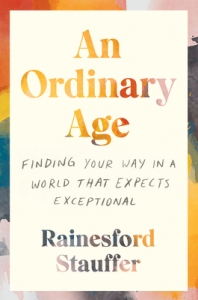Title: An Ordinary Age: Finding Your Way in a World That Expects Exceptional
Author: Rainesford Stauffer
Genre: Journalism
Trigger Warnings: None
Read To: 37%
Back Cover:
Young adulthood: the time of our lives when, theoretically, anything can happen, and the pressure is on to make sure everything does. Social media has long been the scapegoat for a generation of unhappy young people, but perhaps the forces working beneath us–wage stagnation, student debt, perfectionism, and inflated costs of living–have a larger, more detrimental impact on the world we post to our feeds.
An Ordinary Age puts young adults at the center as Rainesford Stauffer examines our obsessive need to live and post our #bestlife, and the culture that has defined that life on narrow, and often unattainable, terms. From the now required slate of (often unpaid) internships, to the loneliness epidemic, to the stress of finding yourself through school, work, and hobbies–the world is demanding more of young people these days than ever before. And worse, it’s leaving little room for young people to ask the big questions about who they want to be, and what makes a life feel meaningful.
Perhaps we’re losing sight of the things that fulfill us: strong relationships, real roots in a community, and the ability to question how we want our lives to look and feel, even when that’s different from what we see on the ‘Gram. Stauffer makes the case that many of our most formative young adult moments are the ordinary ones: finding our people and sticking with them, learning to care for ourselves on our own terms, and figuring out who we are when the other stuff–the GPAs, job titles, the filters–fall away.
Review:
I’m a twenty-something who has been told my whole life that my twenties are supposed to be great, I’m supposed to travel and have great experiences and move around a lot and try new things and date interesting people and find my dream job in my dream career. I was also a Gifted Child growing up, so I was expected growing up to be personally exceptional as well. But lately I’ve been realizing that I don’t want all of that – I don’t want to travel much, I’m tired of moving and want to stay somewhere permanently, I don’t have a “dream job” because I don’t dream of working. I was hoping that this book was an instruction manual for being ordinary in a world that expects exceptional, or at least a persmission slip to only want to be ordinary.
In short, I thought this was going to be a book for me, one of the people talked about on the back cover.
Instead, it was kind of a mess. In some ways it read more like a defence of Millennials to the Gen X-ers and Boomers who think young people are just ungrateful/spoiled/got too many participation trophies/etc. Rainesford says that this book isn’t specifically about any particular generation, just about young people in general, but it reminds me of many of the defences of Millennials that I’ve read on the internet over the years.
At the same time it was simultaneously trying to give young people that permission slip I had hoped for. It wanted to be both a book about young people to help older people understand them and a book for young people to help them accept that they don’t have to do everything expected of them in their twenties, like it’s trying to both defend young people to older generations and comfort the young people themselves. The book felt unfocused and pointless, and so I didn’t feel like there was any point in me finishing it.

